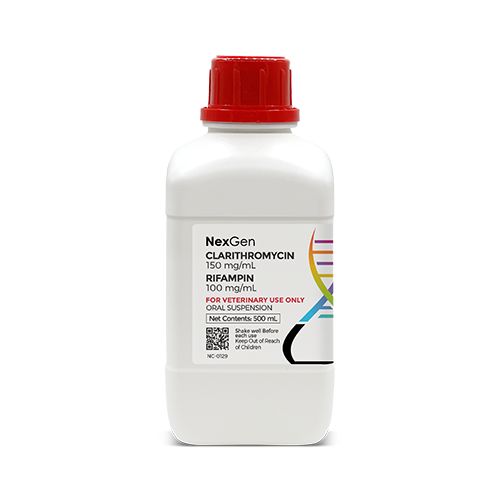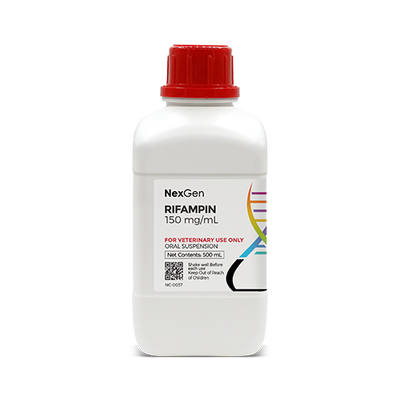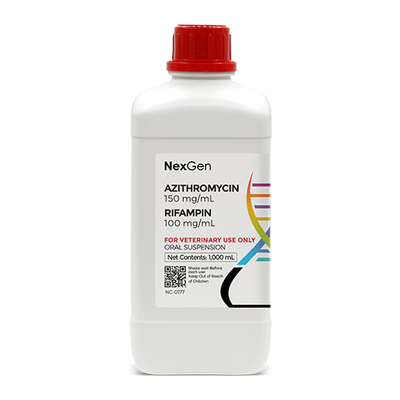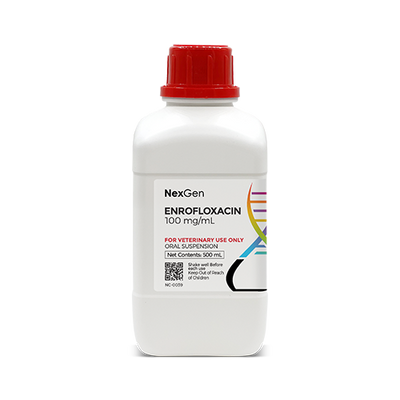
Clarithromycin 150 mg/mL + Rifampin 100 mg/mL, Oral Suspension, 500mL
Login for pricing
- Brand
- Mixlab
- SKU:
- NC-0129
- Product Type:
- Suspension
- Size:
- 500ml
- Administration:
- Oral
Rhodococcus equi is an intracellular pathogen that is a common cause of bronchopneumonia in foals between three weeks and five months of age. While R. equi can be cultured from nearly all horse farms, the clinical disease in foals is endemic at some farms and only sporadic at others.1 The occurrence of clinical disease from R. equi is extremely rare in adult horses.
R. equi is ubiquitous in soil, thus it is quite prevalent in the environment of horse farms. It has been found in soil samples of equine farms in all continents other than Antarctica.2 It is thought that the vast majority or horses have R. equi in their feces, the bacteria tending to thrive in soil contaminated with the feces from horses or herbivores. The frequency of pneumonia caused by R. equi varies across horse farms, with some breeding farms reporting affected foals every year, while others report incidences very occasionally or not at all. “Although it remains unknown why some farms are affected and others are not, it appears that greater density of mares and foals (i.e., mares or foals per acre) and higher concentrations of R. equi in the air (but not the soil) increase the likelihood of disease.”2
It is important to note that this disease is not associated with poor hygiene or management on horse farms; rather, it regularly occurs in large breeding farms that implement excellent practices.
In some instances, infection with R. equi can cause disease in other sites in the body, including the eyes, bone, joints, the gastrointestinal tract and intestinal lymph nodes.2 Signs of disease in other organs may occur in foals with or without concurrent pneumonia. In humans, clinical disease is typically associated with a deficiency of the immune system, such as people infected with HIV or undergoing chemotherapy.
Bronchopneumonia in Foals
Inhalation of virulent R. equi is the chief route of pulmonary infection in foals.1 While the incubation period following experimental intrabronchial challenge varied from approximately 9 days to approximately 2–4 weeks under laboratory conditions, the incubation period under field conditions is unknown and is thought to vary significantly.
The early clinical signs of bronchopneumonia in foals are subtle, and often include no more than a slight increase in respiratory rate and a mild fever. As the disease progresses, clinical signs include:
-
Decreased appetite
-
Lethargy
-
Fever
-
Tachypnea
-
Increased effort of breathing (nostril flaring, increased abdominal effort)
Clarithromycin + Rifampin for Bronchopneumonia in Equines
A wide variety of antimicrobials have proven effective in vitro against R. equi however, due to the intracellular location of the bacteria and its development within pyogranulomatous lesions, drugs that are effective in vitro may not be effective in vivo.2,3 Erythromycin in combination with rifampin has been the standard treatment of R. equi pneumonia. This combination is synergistic in vitro and in vivo, and the combination reduces the likelihood of resistance to either drug. Doses of rifampin range from 5 to 10 mg/kg.3
Adverse effects associated with erythromycin can include environmentally modulated hyperthermia and diarrhea in foals, as well as diarrhea in dams. The latter is generally severe and can be fatal. Diarrhea is likely the result of disrupted intestinal flora by the drug, with clostridial organisms often being implicated.3
Where to buy Clarithromycin + Rifampin
Clarithromycin + Rifampin is available in the U.S. through several pharmaceutical manufacturers and through veterinary custom compounding companies.
FOR RX ONLY: A valid prescription from a licensed veterinarian is required for dispensing this medication.
1Giguère S, Jacks S, Roberts GD, Hernandez J, Long MT, Ellis C. Retrospective comparison of azithromycin, clarithromycin, and erythromycin for the treatment of foals with Rhodococcus equi pneumonia. J Vet Intern Med. 2004 Jul-Aug;18(4):568-73. doi: 10.1892/0891-6640(2004).
2Sweeney CR, Sweeney RW, Divers TJ: Rhodococcus equi pneumonia in 48 foals: Response to antimicrobial therapy. Vet Microbiol 14:326-329, 1987.
3aaep.org.


















